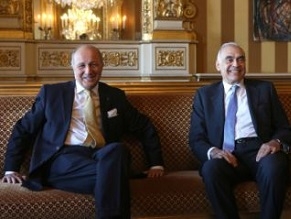|
World Jewish News

French Foreign Minister Laurent Fabius (L) met with his Egyptian counterpart Mohamed Kamel Ali Amr in Paris.
|
French FM to Egyptian counterpart: ‘France tipped the rest of the vote’ on Palestinian statehood at the UNGA
04.04.2013, Israel and the World French Foreign Minister Laurent Fabius paid tribute to Egypt as “a major power in the Middle East” as he sought to emphasise Europe’s desire for a two state solution to be realised to end Israeli- Palestinian conflict, in his meeting on Tuesday with his Egyptian counterpart Mohamed Kamel Ali Amr in Paris.
He insisted France enjoys “a friendly relationship with both the Palestinians and the Israelis” despite its increasing criticism of Israel’s settlement expansion programme in recent months.
Emphasising French support for a two state solution, he insisted that France maintains a close relationship with the Arab world, as he claimed that “France tipped the vote” in favour of November’s decision in favour of Palestinian non-member status at the UN General Assembly, where EU member states were largely divided between abstaining and voting in favour of the resolution.
His comments followed French President Francois Hollande’s own insistence that France’s decision to vote against the expressed condemnation by its Israeli allies of Palestinian moves towards unilateral action, a course similarly rebuked by them US administration, was in line with its commitment “to the oppressed peoples”. “France is true to itself when it defends its values in the world”, he added as he implied criticism of Israel’s continued settlement policy.
Fabius has repeatedly condemned Israel’s ramping up of the settlement expansion in the aftermath of the contentious UNGA vote, reiterating his view that such action “harms trust between the parties and constitute an obstacle to peace”.
“France is particularly concerned by the recent proliferation of settlement decisions that directly threaten the two-state solution. It urges the Israeli authorities to reconsider these decisions and to refrain from any further action,” read previous statements by the Foreign Minister. The French authorities have continued to stress however that the Palestinian recourse to the UN should not come at the expense of direct peace talks with the Israelis, which it advocates as the only route to an effective two state solution.
During a visit by Israeli Prime Minister Benjamin Netanyahu at the start of November, the French President called for a “return to negotiations without preconditions” between the Israelis and Palestinians and cautioned against “the PA temptation to go seek recognition from the UN general assembly which it could not seek from negotiations”.
France sought to cement its commitment to Egypt as a significant player on the international stage during November’s Gaza escalation, when Holland revealed he had chosen to make contact with his Egyptian counterpart Mohamed Morsi in preference to Netanyahu. In an official statement on the two leaders’ conversation, Hollande said he had “expressed France’s deep concern” at the latest flare-up of violence in the region and “called for restraint to avoid an escalation which would endanger the population” of Gaza and the south of Israel.
Stressing the role “Egypt could play in diminishing tensions”, Hollande’s statement went on to insist that “all the international community’s efforts must combine to avoid all unilateral activity and all provocative action which could aggravate the situation”. His position was later compounded by the EU’s own heralding of Egypt’s eventual success in brokering a ceasefire agreement between the Israelis and Gaza militant rulers Hamas.
Speaking of his hopes for Egypt to continue to pursue its journey towards democratic transition, in light of 2011’s popular uprising which displaced longtime authoritarian leader Hosni Mubarak from power, at the joint press conference Tuesday, Fabius stressed that whilst France had “no intention of interfering...we insist on what we believe are the essential conditions of a pluralistic and free society”, namely women’s rights, fully functioning institutions, a free media and free organisation of civil society.
by: Shari Ryness
EJP
|
|
